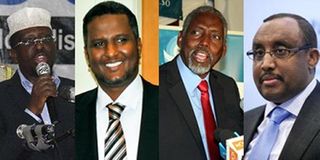Optimism as Somalia goes to polls

Photo|ABDULKADIR KHALIF
Some of the candidates in the running for Somalia's presidency, from left, incumbent President Sheikh Sharif Sheikh Ahmed, Mr Abdurahman Abdishakur Warsame, Mr Abdurahman Moalim Abdullahi Badiyow and TFG prime minister Abdiweli Ali.
What you need to know:
- For many Somalis, the elections which have attracted more than 60 candidates present a golden opportunity for peace and national renewal.
- They are taking place against the backdrop of the final onslaught by Amisom troops on Kismayu, the remaining bastion of Al-Shabaab militants.
- A two-chamber Parliament, made up of 275 MPs from the Lower House and 54 others from 18 administrative regions making up the Upper House, will elect the next occupant of Villa Somalia.
- The election will largely revolve around clans whose elders are entrusted with the election of the 275-member Parliament that will, in turn, choose the President. Clans are the bedrock of the county’s politics.
A flicker of hope lingers over war-weary Somalia. The country goes to the polls on Monday to pick a new president as the curtain falls on the Transitional Federal Government.
The historic elections, to be conducted by the clan-influenced Parliament, come a year after the withdrawal of Al-Shabaab militants from Mogadishu.
For many Somalis, the elections which have attracted more than 60 candidates present a golden opportunity for peace and national renewal.
They are taking place against the backdrop of the final onslaught by Amisom troops on Kismayu, the remaining bastion of Al-Shabaab militants. (READ: The battle for Somalia)
The peace process that resulted in the recent declaration of a new federal constitution and the routing of the terror group has heightened the optimism of the returning Somalis as their country of 11 million people turns a new page.
A two-chamber Parliament, made up of 275 MPs from the Lower House and 54 others from 18 administrative regions making up the Upper House, will elect the next occupant of Villa Somalia.
The date falls on Idd-ul-Fitr, when Muslims mark the end of the Holy Month of Ramadhan. Prime Minister Abdiweli Mohamed Ali, a presidential candidate, says the country is at a “crossroads”.
“The people believe that the time has finally come. We’re optimistic about the future and the direction the country will take,” Dr Ali told the Sunday Nation from Mogadishu.
The principal candidates in Monday’s contest are President Sheikh Sharif Sheikh Ahmed, Dr Ali, House Speaker Sharif Hassan Sheikh and former Prime Minister Mohammed Gedi.
Prof Gedi was in Nairobi last week at the launch of a peace campaign dubbed It’s Time To Save Somalia where former President Daniel Moi was the chief guest.
Mr Moi gave a message of hope for the future of Somalia and asked its leaders to use the election as an opportunity for national reconstruction and reconciliation.
The other candidates are former Cabinet ministers Abdurahman Abdishakur Warsame and Mohamed Mohamoud Guled who are in a loose coalition with a group of academics, among them professors Ahmed Ismael Samatar, Ahmed Mumin Warfa and Hassan Sheikh Mohamoud.
A former Unicef employee, Mr Hassan Sheikh Mahamud, 57, who is the founder chairman of the Peace and Development Party, says he wants to transform the country’s economy if elected.
He was part of the Somali peace talks in Eldoret and Mbagathi, leading to the formation of the Transitional Government.
The latest entrant in the crowded race is journalist Yusuf Garaad who resigned this month as the head of the BBC Somali Service.
“I believe the diaspora will have a big role to play in Somali politics. We have seen what peace and development mean,” he told the BBC.
Probably because of his broadcasts in support of the war on Al-Shabaab, shortly after landing in Mogadishu, the group declared that it will eliminate him. But he sounded resolute and unbowed.
The election will largely revolve around clans whose elders are entrusted with the election of the 275-member Parliament that will, in turn, choose the President. Clans are the bedrock of the county’s politics.
Somalia has five major clan families. They include the Isaq who are settled in the northwest, the Rahanweyn in the Bay and Bakool regions, the Hawiye in central and southern Somalia, the Darod along the southern border with Kenya and Ethiopia, and the Dir who live in the southern parts of the country.
President Sheikh Ahmed, who studied religion in Libya, is from the Hawiye clan which is dominant in Mogadishu. Though facing allegations of incompetence and corruption, President Ahmed is the front-runner because of incumbency.
The former school teacher and leader of the Islamic Courts Union claims credit for restoring a semblance of stability and has promised to rebuild the country and promote constitutionalism.
“I want the next government to be a government of the rule of law, a government that restores the rule of law. We can attain that by rebuilding our institutions and empowering them to do their respective jobs,” he said.
Dr Ali has also built his campaign on efforts to restore peace and the delivery of a new Constitution.
The Prime Minister, who left a job in the United States, says he is comfortable with the peace achieved in Mogadishu so far.




